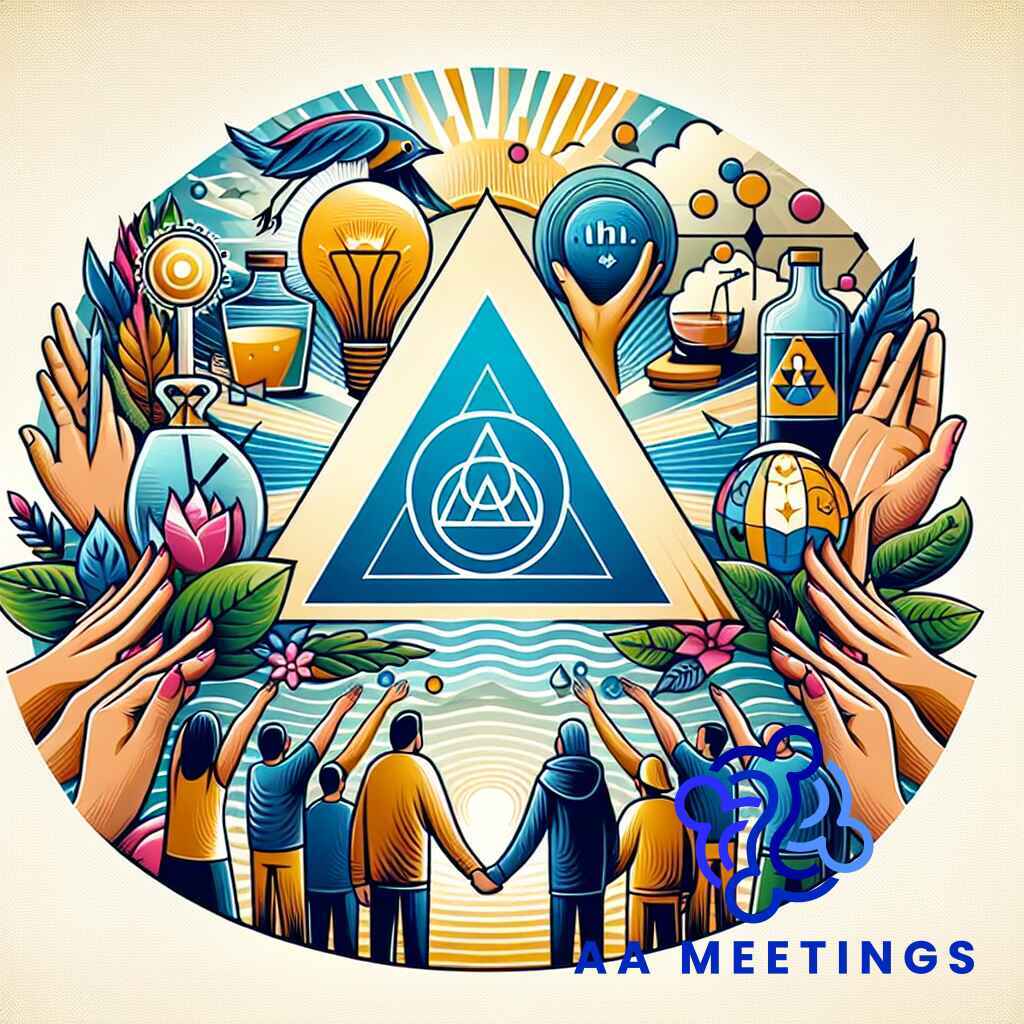
March 2, 2024
Embarking on a Journey to Recovery
Understanding the Impact of Alcohol Addiction
The path to overcoming alcohol addiction begins with acknowledging its profound impact on your life and the lives of those around you. Alcohol addiction, deeply rooted in both physical and psychological realms, can alter one’s behavior, strain relationships, and even exacerbate mental health issues. The first step toward recovery involves recognizing that alcohol dependency is not a failure of willpower but is often a manifestation of the disease theory of alcoholism, which posits addiction as a complex, multifaceted condition requiring comprehensive treatment. Understanding this framework is crucial, as it shifts the perspective from blame to one of healing and recovery.
The Role of AA Meetings in Alcohol Dependency Recovery
AA meetings serve as a cornerstone for many in their recovery journey from alcohol addiction. Alcoholics Anonymous provides a safe, inclusive environment where individuals can share their experiences, strengths, and hopes with others facing similar challenges. This supportive setting is grounded in the Twelve Step Program, a set of guiding principles for addiction recovery, which emphasizes personal accountability, spiritual awakening, and mutual aid. Participation in AA meetings allows individuals to not only receive support but also to offer it, creating a reciprocal network of care that is essential for long-term sobriety.
Creating Your Roadmap: The First Steps to Sobriety
Embarking on the journey to sobriety is a critical, yet challenging, phase that demands a well-thought-out plan. The initial steps involve tangible actions such as identifying triggers, acknowledging past attempts at sobriety, and setting achievable goals. Additionally, it’s pivotal to learn about and utilize resources like the AA Meetings Directory, which can direct you to local and online AA meetings tailored to your specific needs. These meetings are instrumental in building a support network of individuals who understand the challenges of recovery. Furthermore, leveraging tools such as the Sobriety Calculator can provide motivational milestones and insights into your progress. As you chart your unique roadmap to recovery, remember that the journey is personal and evolving, requiring patience, persistence, and the support of a compassionate community.
Unraveling the AA Meetings Directory
Navigating the AA Meetings Directory
The AA Meetings Directory is an essential tool for anyone embarking on the sobriety journey. Accessing this comprehensive resource is your first step towards locating a supportive community that resonates with your recovery goals. As you dive into the AA Meeting Blog, you’ll discover insights and strategies for navigating the directory effectively. The platform is intuitively designed, allowing users to filter meetings based on specific preferences such as location, time, and type of meeting. Whether you are seeking a traditional in-person gathering or an online session to accommodate your schedule, the directory simplifies your search process, guiding you to meetings that best suit your needs.
Finding AA Meetings Near You
Locating AA meetings in your vicinity is simplified with the AA Meetings Directory. By leveraging the search functionality, you can easily enter your city, state, or zip code to uncover a list of available meetings nearby. This localized approach ensures that you can find a support network within your community, fostering connections with individuals who understand the intricacies of the recovery process. It’s important to remember that each AA group may offer different formats and focuses, such as open discussions, speaker meetings, or literature-based sessions. Exploring various groups allows you to identify the ones that most effectively contribute to your journey towards sobriety, offering a sense of belonging and mutual support.
Benefits of AA Meetings Online and Local
In today’s digital age, the accessibility of AA meetings has tremendously expanded, thanks to the option of online gatherings. These virtual sessions provide an invaluable resource for those unable to attend in-person due to geographical constraints, health concerns, or personal commitments. Online AA meetings ensure that support is just a few clicks away, offering the flexibility to join from anywhere at any time. This format ensures that even in the face of challenges, your support network remains unbroken, reinforcing your commitment to recovery.
Conversely, local AA meetings offer the irreplaceable benefit of face-to-face connection. These gatherings forge deep, personal bonds, allowing for a shared experience that can significantly enhance one’s sense of community and belonging. The physical presence of peers provides a tangible reminder of the shared goal of sobriety, fostering empathy, understanding, and mutual encouragement.
Whether you choose online or local AA meetings, each format offers its unique advantages. The key is finding the balance that best supports your recovery journey, ensuring that you have the tools and resources necessary to maintain your path to sobriety. The AA Meetings Directory stands as a bridge, connecting you to a network of support that aligns with your individual needs, making the journey towards a sober life a shared endeavor.
The Bedrock of Support: Alcoholics Anonymous
Introduction to the 12 Steps Program
Alcoholics Anonymous has long been synonymous with recovery from alcohol addiction, central to which is the 12 Steps Program. This foundational framework offers a structured pathway to sobriety, encouraging individuals to confront their addiction, make amends for past wrongs, and cultivate a spiritual life. Each step serves as a cornerstone in the recovery process, designed to address both the psychological and spiritual aspects of addiction. The beauty of the 12 Steps lies in their universality, they have been adapted to assist with a wide range of addictions, showcasing their profound impact on individuals seeking a life of recovery and spiritual growth. Exploring these steps within the supportive environment of AA meetings allows members to delve deep into each principle, fostering personal reflection and communal healing.
The Core Principles of Alcoholics Anonymous Support
At the heart of Alcoholics Anonymous’ ethos are principles of anonymity, solidarity, and mutual aid, which embody the spirit of the support group. Anonymity ensures a safe, non-judgmental space where individuals can share their experiences without fear of disclosure outside the group. This principle fosters a culture of trust and equality, where members are valued for their shared humanity rather than their social status or past. Solidarity and mutual aid are equally fundamental, emphasizing the importance of communal support in the journey toward sobriety. Members learn to lean on one another, sharing wisdom, strength, and hope. This interdependence is crucial, reinforcing the notion that recovery is not a solitary endeavor but a collaborative pursuit toward a common goal.
The AA Fellowship: More Than Meetings
The fellowship of Alcoholics Anonymous extends far beyond the confines of regular meetings. It represents a thriving, compassionate community of individuals united by their shared goal of sobriety and personal growth. This network offers a variety of engagement opportunities, from sponsorship and mediation to social gatherings and service work, allowing members to deepen their connections and apply the principles of AA in their daily lives. The fellowship cultivates a sense of belonging and purpose, attributes that are essential for sustained recovery. Members often describe the fellowship as a newfound family, a community that welcomes them unconditionally and supports them through the ups and downs of recovery. This aspect of AA underscores the profound impact that a supportive network can have, not just in overcoming addiction, but in building a fulfilling, sober life.
Cultivating Your Support Network
The Importance of Peer Support in Recovery
In the challenging journey of recovery from alcohol addiction, the importance of building a strong support network cannot be overstated. Peer support plays a pivotal role, offering not just companionship but an invaluable exchange of shared experiences and wisdom. Within the framework of AA meetings, the principle of mutual aid forms the bedrock of the recovery process. It serves as a powerful reminder that you are not alone in your struggles. This collective camaraderie, forged in empathy and understanding, amplifies the resilience and determination of each member. Additionally, engaging with others who are navigating similar paths cultivates a sense of accountability, increases motivation for sobriety, and significantly enhances the emotional and psychological well-being of participants.
How to Engage with AA Support Groups
Engaging effectively with AA support groups is both an art and a science. The first step involves actively seeking out AA meetings that resonate with your personal recovery needs and preferences. Approach each meeting with an open mind and a willing heart, ready to share your journey and listen to others. Volunteering to participate in discussions or to take on service roles within the group can deepen your sense of belonging and investment in the community. Additionally, consider the value of finding a sponsor within the group – someone who has successfully navigated the challenges of recovery and can provide guidance, support, and accountability. Building meaningful relationships within AA support groups encourages a culture of transparency and trust, essential components for long-term recovery.
Building Personal Connections in the Sober Community
Beyond the bounds of formal AA meetings, cultivating personal connections within the sober community is equally important. Participate in social activities and events organized by the sober community to broaden your support network and discover new hobbies and interests that complement your sober lifestyle. Connecting with others who share your commitment to sobriety can enrich your social life and offer alternative avenues for enjoyment and fulfillment without the presence of alcohol. Additionally, leveraging online platforms and social media groups dedicated to sobriety can provide continued support and inspiration. By nurturing these personal connections, you create a robust safety net, a community of allies who understand the nuances of recovery and are invested in your success. This network becomes not just a source of support during challenging times but also a wellspring of joy and mutual achievement in your sobriety journey.
Tools for the Journey

Utilizing the Sobriety Calculator
In the pursuit of sobriety, tracking progress serves as both a motivational tool and a reflection of one’s commitment to a life free from alcohol. The Sobriety Calculator, accessible through the AA Meetings Directory, offers individuals an empowering way to quantify their achievements on the journey to recovery. By entering your sobriety date, you can instantly view the number of days, months, or even years you’ve remained sober. This simple act of acknowledgment reinforces the significance of each sober day while providing a tangible measure of how far you’ve come. It’s a testament to personal strength and resilience, affirming the positive impact of embracing sobriety.
Additionally, the Sobriety Calculator can be a source of inspiration, especially during challenging times. By visualizing your progress, you’re reminded of your capabilities and the importance of perseverance. Sharing your milestones within your support network or AA meetings generates a ripple effect, encouraging others in their recovery journey. Furthermore, marking special sobriety anniversaries can be an uplifting experience, celebrated with those who’ve supported you along the way. Utilizing this tool not only aids in self-reflection but also strengthens the bonds within the sober community, making the journey towards lasting sobriety a collective achievement.
Resource Highlight: AA Meetings Directory
The AA Meetings Directory emerges as a pivotal resource for individuals navigating the complexities of alcohol addiction and recovery. This comprehensive platform facilitates the discovery of Alcoholics Anonymous meetings across all 50 states, ensuring everyone has access to the support they need, regardless of location. The Directory’s intuitive design and user-friendly interface simplify the search for meetings that align with your recovery needs, whether you’re looking for in-person gatherings or virtual meetings to fit your schedule.
Beyond its functional role in connecting individuals to AA meetings, the AA Meetings Directory embodies a deeper mission. It’s a testament to the power of community and mutual support, offering a beacon of hope for those struggling with alcohol dependency. Within its pages, users find not only a list of meetings but also a wealth of informative articles, personal testimonials, and resources designed to support every stage of the recovery journey. By highlighting the importance of the AA fellowship and the 12 steps program, the Directory serves as a comprehensive guide for those seeking a path to sobriety, reinforced by the strength of a supportive community.
Supplemental Readings and Recovery Materials
Understanding that recovery from alcohol addiction is a multifaceted process, the utilization of supplemental readings and recovery materials can significantly enhance the journey. These resources offer valuable insights into the nature of addiction, strategies for maintaining sobriety, and personal stories of triumph over substance abuse. Engaging with a variety of materials, including books recommended by Alcoholics Anonymous, sobriety blogs, and educational articles, allows individuals to gain a broader perspective on recovery while finding strategies that resonate with their personal experiences.
The AA Meetings Directory underscores the importance of these supplemental resources by curating a selection of readings and materials that complement the principles of the 12 steps. From guides on navigating triggers and managing stress without alcohol to inspirational accounts of recovery, these resources serve as additional tools in the sobriety toolkit. By incorporating these readings into your recovery strategy, you enrich your understanding of addiction and expand your repertoire of coping mechanisms. This proactive approach not only bolsters your defense against relapse but also fosters a deeper, more meaningful engagement with the recovery process, ultimately contributing to a stronger foundation for lasting sobriety.
Realizing the Benefits of AA Meetings
How AA Meetings Foster Long-lasting Sobriety
AA meetings offer more than just a communal space for sharing experiences, they are the backbone of many individuals’ path to sustained sobriety. By participating in these gatherings, members are continuously reminded of the importance of daily commitment to their recovery journey. The structure of AA meetings, rooted in the 12 steps of AA, provides a blueprint for living without reliance on alcohol, emphasizing moral principles and mutual support. This structured approach helps members develop coping strategies for dealing with the triggers and stressors that might otherwise lead to relapse. Moreover, the sense of accountability that comes from being part of an AA group reinforces members’ dedication to their sobriety goals. The regular reinforcement of these principles, combined with the empathy and understanding from peers, creates a potent environment conducive to long-lasting sobriety.
Testimonies: The Transformative Power of AA
The transformative power of AA meetings is most vividly illustrated through the personal testimonies of its members. These stories of struggle, resilience, and ultimate triumph over alcohol addiction serve as powerful testaments to the efficacy of the AA program. Each testimony is a unique journey from the depths of dependency to the heights of sobriety, yet a common thread binds them all: the pivotal role of AA in their transformation. The sharing of these experiences during meetings not only provides hope and encouragement to others but also reinforces the speaker’s own commitment to sobriety. It’s through these narratives that the true spirit of the AA fellowship shines-the unwavering support, the shared victories, and the collective perseverance. These stories underscore the fact that while the journey to sobriety is deeply personal, it doesn’t have to be navigated alone.
Embracing the 12 Steps of AA in Daily Life
Integrating the 12 steps of AA into daily life is a practice that extends the benefits of AA meetings into all aspects of personal and professional living. This active embrace of the steps fosters a mindful approach to life’s challenges, a deep sense of personal responsibility, and an ongoing commitment to growth and self-improvement. Members find that principles such as making amends, conducting personal inventories, and seeking spiritual connection become guiding lights, not just in maintaining sobriety, but in enhancing relationships, moral decision-making, and overall well-being. The influence of the 12 steps becomes evident in members’ interactions with others, their approach to adversity, and their dedication to service within and outside the AA community. By living the 12 steps, individuals not only solidify their sobriety but also contribute to a ripple effect of positivity and transformation within their circles and beyond. This holistic application of the 12 steps illustrates that AA’s efficacy lies not just in combating alcohol addiction, but in facilitating a way of life characterized by integrity, purpose, and interconnectedness.
Expanding Your Recovery Toolbox

Overcoming Challenges: Strategies for Avoiding Relapse
The road to recovery from alcohol addiction is often fraught with challenges, including the looming threat of relapse. Developing effective strategies to navigate these obstacles is crucial for maintaining sobriety. A comprehensive approach involves recognizing early warning signs, such as increased stress, feeling isolated, or romanticizing past alcohol use. Proactively managing these signs through healthy coping mechanisms, like mindfulness exercises, reaching out to your support network, and attending additional AA meetings, can fortify your defenses against relapse. Integration of relapse prevention planning within the framework of the 12 steps of AA also provides a structured method to identify triggers and outline specific, actionable steps to take when faced with high-risk situations. This proactive approach ensures that individuals are not only prepared to face triggers but also have a robust plan to maintain their sobriety under pressure.
Adopting Healthy Lifestyle Changes
Sobriety isn’t just about abstaining from alcohol-it’s about fostering a healthier, more fulfilling lifestyle that supports your long-term recovery goals. Adopting healthy lifestyle changes plays an indispensable role in enhancing both your physical and mental wellness. Incorporating regular exercise, balanced nutrition, and adequate sleep into your routine can drastically improve your energy levels, mood, and resilience against stress. Additionally, exploring new hobbies or revisiting old interests can provide a constructive outlet for the time and energy that were once dedicated to alcohol use. These changes not only bolster your physical health but also promote a positive self-image and a sense of accomplishment. Engaging in activities such as meditation or yoga further supports your mental health, offering tools for stress management and emotional regulation. Embracing these lifestyle changes contributes to a more holistic recovery, enriching your life with purpose and joy beyond the confines of addiction.
Engaging with Sobriety Support Beyond Meetings
While AA meetings provide a crucial foundation for your recovery, broadening your support network beyond these meetings can significantly enhance your sobriety journey. Expanding your toolbox to include additional resources such as Narcotics Anonymous Meetings (NA Meetings) or seeking the guidance of an Addiction Treatment Center, can cater to a broader spectrum of needs and challenges you may face. Engaging with sobriety-oriented online communities, forums, and social media groups offers accessibility to support and motivation at any time. For individuals seeking a more immersive recovery environment, sober living houses present a structured, substance-free living space that encourages accountability and communal support. Furthermore, volunteering within the sobriety or broader community can foster a sense of purpose and fulfillment, reinforcing your commitment to recovery. By integrating a diverse array of supports into your recovery plan, you cultivate a more resilient and dynamic network, capable of sustaining you through every phase of your journey to lasting sobriety.
Navigating Setbacks with Your Support Network
The Role of the Support Network in Facing Relapse
Relapse is often viewed as a daunting setback in the journey toward recovery, yet it holds potential for deep reflection and learning within the support network of AA meetings. The AA Meetings Directory emphasizes the importance of a strong support network in navigating relapse with resilience. In these critical moments, the collective wisdom and shared experiences of the group offer invaluable insights into coping strategies and recovery mechanisms. The ethos of Alcoholics Anonymous fosters a space where individuals can openly discuss their struggles without fear of judgment, ensuring that even in the face of relapse, members feel supported and understood. This environment encourages a collective approach to problem-solving, where the focus is not on assigning blame but on finding actionable ways to regain sobriety. Through these interactions, the support network becomes a vital lifeline, offering hope and encouragement to persevere despite setbacks.
Learning from Setbacks: A Step Towards Growth
Setbacks in recovery, such as relapse, are often laden with feelings of guilt and defeat. However, they also present a unique opportunity for personal growth and learning. Within the supportive framework of AA meetings, individuals are encouraged to view setbacks as integral steps toward long-term recovery. This perspective shifts the narrative from one of failure to one of constructive self-discovery. By analyzing the circumstances that led to a setback, individuals can gain critical insights into their behavior patterns and triggers. This introspective process, supported by the guidance and empathy of the AA community, allows for the development of more robust coping strategies and a deeper commitment to the recovery journey. The role of peer support in fostering an environment where setbacks are considered a natural part of the learning process cannot be understated. It reinforces the idea that growth is nonlinear and that every experience, regardless of its immediate outcome, is a valuable contributor to the overarching goal of sobriety.
Reinforcing Your Sobriety Network
The journey toward recovery from alcohol addiction is one that benefits immensely from a reinforced sobriety network. Actively cultivating and engaging with a support network is key to navigating the path to sobriety with resilience and determination. Participation in AA meetings forms the core of this network, providing a safe haven where individuals can share their experiences, lean on each other for support, and collectively celebrate milestones. Beyond formal meetings, strengthening connections with fellow members of the sobriety community can further solidify one’s commitment to recovery. This might involve more personal interactions, such as one-on-one meetings, or engaging in group activities that promote sober living. Additionally, exploring resources such as the Addiction Treatment Center: Reco Intensive can offer professional guidance and support tailored to individual needs. Through a combination of these supportive relationships and resources, the sobriety network becomes a dynamic and encompassing safety net that empowers individuals to face challenges head-on, fostering a sense of belonging and shared purpose critical for overcoming setbacks and advancing in one’s recovery journey.
A Beacon of Hope: Your Guide to Lasting Sobriety
Reaffirming Your Commitment to Recovery
The journey to sobriety is a profound commitment-one that requires continual dedication and renewal. In moments of doubt or when faced with challenges, reaffirming your commitment to recovery becomes a beacon of hope, illuminating the path forward. Central to this process is the support network you’ve built through AA meetings. It’s here, within the embrace of the Alcoholics Anonymous community, that the weight of your struggles is shared, and the strength of collective resolve lifts you. Remember, recovery isn’t a destination but a journey of daily commitment. Each morning presents a new opportunity to recommit to your sobriety, to embrace the principles of the 12 Steps of AA, and to act with intentionality towards your wellness and growth.
AA Meetings: The Heart of the Sobriety Journey
AA meetings stand as the heart of the sobriety journey, offering a constant rhythm of support, understanding, and guidance. These gatherings are not just a place to share struggles, they’re a space where victories are celebrated, where wisdom is freely exchanged, and where the human spirit’s ability to overcome is witnessed time and again. The efficacy of AA meetings in fostering long-lasting sobriety is evidenced not only in the collective experience of its members but also in the personal testimonies of transformed lives. By actively engaging in AA meetings, you’re not just attending another event on your calendar. You’re participating in a dynamic, evolving process that nurtures your personal growth and bolsters your recovery every step of the way.
Looking Ahead: Continuing Your Growth and Contribution
Content: As you solidify your foundation in sobriety and inch further along your recovery journey, looking ahead becomes crucial. Anticipating future growth involves not just focusing on personal milestones but also contemplating how you can contribute to the broader recovery community. This might mean serving as a sponsor, volunteering at AA-related events, or sharing your journey at meetings to inspire others. Engagement beyond personal recovery cultivates a deep sense of purpose and fulfillment, illustrating the transformative power of giving back. Moreover, it reinforces the critical role a support network plays, not just in achieving sobriety, but in sustaining it. The journey ahead is ripe with opportunities for continued growth and contribution, guided by the convictions and principles refined through your experiences within AA. Your story, a unique testament to resilience, becomes a pillar of hope and encouragement for others embarking on their own journey to recovery.


